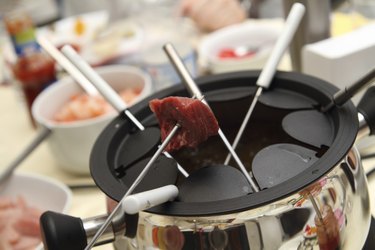
Sweet or savory, fondue is an interactive dish that requires diners to play with their food. Long-handled forks, loaded with a chunk of fresh fruit or vegetable, bread or meat, are dipped in cheese, chocolate or hot oil. The only tricky part of using a fondue pot is regulating the temperature.
Plug It In
Video of the Day
Electric fondue pots have the advantage when it comes to controlling the temperature of the oil or sauce. If the contents of the pot get too hot, simply turn the heat down. If it's too cool, turn it up. You'll learn to gauge the temperature as you use the pot. If the oil is smoking, or the sauce boiling too vigorously, it's too hot. Conversely, if the food isn't cooking or the cheese is congealing, it's too cool.
Video of the Day
Play with Fire
Open-flame pots are truer to their 1960s fondue party origins, but regulating the temperature is a little bit trickier. Sterno or a similar gel fuel creates the heat for most open-flame fondue pots, and the container for the fuel at the base of the pot has a lid that slides back and forth. If the contents of the pot overheat, you can either close the lid completely, or use it to block some of the flame, lowering the temperature.
Classic Ingredients
Classic cheese fondue, a dish that made its way to America in the 1950s, contains Gruyere cheese, kirsch and seasonings. Cornstarch adds thickness and keeps the cheese smooth. Update the recipe by using beer instead of wine and trying other cheeses. Dip fresh fruits or cubed pound cake into chocolate fondue, a sweet combination of cream and chocolate flavored with vanilla. For a meat-based fondue, heat oil or broth in the pot and cook meat, poultry or fish. Be careful -- the oil must be 350 degrees Fahrenheit.